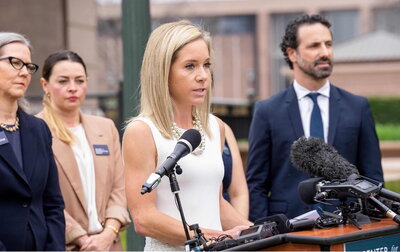On October 31, 2023, Penelope Deutscher gave the lecture “Revocability, Exception, Disqualifying Qualification: Grammars of Power After Foucault and Roe” for the Unit for Criticism’s Modern Critical Theory lecture series.
As a Foucauldian scholar, Deutscher’s work traces power through Foucault’s original theory and the revised grammars that have come afterwards. The MCT lecture comes from her current project to name hinges of power in contemporary discourse and offers qualifying disqualification and disqualifying qualification as an intervention in naming methods of regulation. While the talk did not focus on the specific lineages of Foucauldian grammar, Deutscher did draw significantly from other scholars who have been influenced by Foucault to name the ways that pregnant people’s bodies (most often referred to as women in this lecture are policed and regulated by the state.
Citing discourses around the 1973 Roe v. Wade and 2022 Dobbs v. Jackson decisions, Deutscher began her talk with a discussion of the “power” that is often cited in Supreme Court decisions regarding women’s access to abortions. Specifically, Deutscher unpacked the way Justice Alito discussed “power” in the Dobbs decision. Referring to Justice White’s dissent from the Roe decision in 1973, Alito stated that Roe had been an exercise of in “wielding nothing but “raw judicial power” and an example of the court going too far. Conversely, Alito celebrated the Dobbs decision, arguing that it returned power to women as they now had the power to exert control over their right to abortions through the ballot box. As Deutscher pointed out, however, this designation of “power” and calculation of women as 55% of the electorate (variable by state) views them as a percentage count- reducing people who may become pregnant to a single identity and ignores any identity factors (such as race, class, sexuality, etc.) that would impact their voting decisions.

Moving to an example outside of the United States, Deutscher used the example of a German AfD (Alternative for Germany, a far-right political party) billboard aligning pregnancy with national futures. The billboard, Deutscher argues, called both to a party bloc and to voters who may bear children. In this way, the billboard presents the biopolitical aim of creating more white, German, AfD citizens, with the subtext that other new citizens--those of the immigrants not imagined in the voting bloc—are undesirable in the AfD’s national imaginary.
Drawing from other theorical work influenced by Foucault, namely Sadiya Hartman’s conceptualization of “burdened individuality” and Michelle Goodwin’s work on fetal protection laws. Deutscher combines these frameworks and uses the concept of the “double bind” to name the “hinge” of power that defines women’s experiences with pregnancy and the state. This occurs through:
- Biopolitical interest
- Decision making process
- Culpability for pregnancy
In the above examples, Germany’s AfD billboard represents the biopolitical interest at stake in having German women birth more citizens, thereby increasing the voting bloc. Somewhat differently, Alito’s description of women’s voting power best represents the illusion that women’s ability to vote will grant them sole responsibility/power in regulating access to abortions . Finally, regarding the “double bind,” Deutscher argues that the state holds women responsible by viewing pregnancy as the result of a decision made exclusively by women, and that effects on the fetus in utero are seen as solely determined by the mother rather than influenced by outside systemic factors such as environments, socioeconomic factors, etc. For a more extensive discussion of how these factors impact fetal protection laws see Goodwin’s article.
To further illustrate this hinge of power and how it places undue responsibility on the individual women, Deutscher introduces qualifying disqualification evident in an NPR interview with Jim Olson. When questioned about the new abortion bill in Oklahoma and whether access to contraception or expanded welfare services after birth would be made available, Olsen stated that the former was a non-issue because it was widely available, and that the latter wouldn’t be addressed because the parents had the responsibility of “taking [sic] their own children.” While Deutscher points out that this could have been a misstep in language, it actually highlights the double bind of the pregnant person. Here, the pregnant woman who would need or want access to abortion, is denied greater access to the birth control that would’ve rendered the abortion unnecessary and barred access to welfare services after being forced to carry the pregnancy. Not only does Olsen’s admonishment that parents must “take[] their children” presuppose that they will fail at this task, it relegates them to the designation of “bad” parents. Meanwhile, for those parents who don’t need access, or are assumed not to need access, they are assumed to be good parents, and are exempted from qualifying. In this way, scrutiny always remains on those that would have needed/wanted the abortion rather than those who didn’t. Regardless of who the “good” parents are or could be in this scenario, they will all “take” their children. But the former will be disqualified from the qualification of “good parent” (hence the qualifying disqualification), while the latter is already assumed to be qualified, and as such no qualifying scrutiny is applied (disqualifying qualification).
Moving on from these hinges of power, Deutscher then spoke of her work to elucidate a more capacious understanding of revocability, arguing that when the right to abortion exists in a state of legality versus illegality subject to varying conditions, a state of exception is formed. This state of exception leads to disqualifying qualification/qualifying disqualification that defines the likelihood of prosecution/persecution, as the pregnant person’s life becomes remains secondary to the fetus they carry and its biopolitical potential. As Justices Breyer, Sotomayor, and Kagan argued in the dissenting opinion to Dobbs, “from the very moment of fertilization, a woman has no rights to speak of as her rights have been traded for those of the fetus.” Further, this means that women live in a state of exception with the potential for their pregnancy to become criminalized, as any impact on the fetus is viewed as the sole impact of her actions rather than any other environmental or social condition (Goodwin).

To tie the concept of the hinges of power with the concept of the state of exception, Deutscher then turned to the example of Amanda Zurawski, a white woman in Texas whose life was endangered when a medically necessary abortion was delayed until her fetus no longer had a heartbeat, due to the doctor’s fear of violating Texas’ anti-abortion laws. In a press conference, Zurawski stated “They try to paint people who need abortion as young women of color, single, uneducated… I look like the demographic that they want to believe would never need or want an abortion.” It is in this example that the state of exception is made clear, as there were so many other, imagined, options and privileges in place to exempt women, especially women like Zurawski, from having/needing an abortion in the first place. Because there were so many options, Deutscher argues that hinges of power and the state of exception actually work to exempt these women from complaint, resulting in disqualifying qualification as their attempts to be heard only cause scorn, further disqualifying them instead of qualifying them to their rights.
As a coda to her lecture, offering an example that isn’t defined by right-wing discourse, Deutscher offered the example of the Mexican Supreme court naming the criminalization of pregnancy as violence, and legalizing abortion nationwide. After that decision, a woman interviewed in Mexico City offered an example of how disqualifying qualification worked even in liberal discourse, as she affirmed that abortion should be legal and accessible, but that it shouldn’t operate as a form of birth control. On the way to receive an abortion herself, this woman viewed her own abortion through disqualifying qualification, as already qualified and deserving of her right while viewing the abortion rights of other women though qualifying disqualification. In her view, other women’s right to abortion was undeserved and subject to scrutiny because these women are figured as using abortions as a form of birth control--something that would cause them to exist in an unqualified state of exception as irresponsible citizens.
As noted in the lecture, Deutscher’s work in theorizing these grammars of power is intended for a future publication.